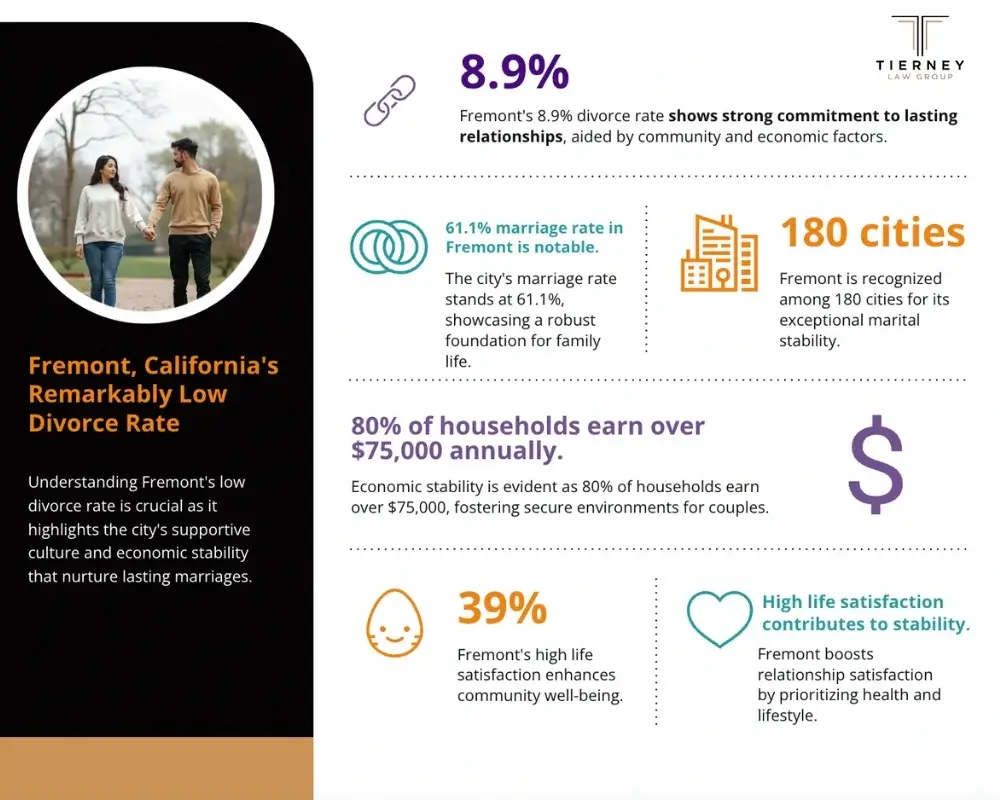Fremont Divorce Lawyer
Divorce Attorney In Fremont, CA
Navigating the complexities of divorce can be emotionally challenging, especially when legal considerations arise regarding child custody, property division, and spousal support. An experienced Fremont divorce lawyer can guide you through the process and protect your interests throughout the divorce.
Whether your case involves amicable negotiations or more contentious disputes, Tierney Law Group can make a significant difference in the outcome of your divorce.
Kent P. Tierney, founder of Tierney Law Group, brings over 20 years of legal experience and has handled more than 100 trials. He specializes in family law, including high net-worth divorces, child custody, spousal support, and complex property division. His straightforward approach and deep understanding of California divorce law make him a trusted advocate for clients facing challenging family law matters.

The Role of a Fremont Divorce Lawyer
A Fremont divorce law attorney has a critical role in helping you understand your legal rights and options during the divorce process in Fremont, CA. Divorce involves various legal issues that need to be addressed, including property division, child custody, spousal support, and more.
Our Fremont family law attorney can work with you to create a strategy tailored to your unique situation. Our firm can also make sure your family’s needs are prioritized throughout the process.
Divorce in Fremont, CA: A City of Strong Marital Bonds
Fremont, California, stands out for its remarkably low divorce rate. As of 2021, only 8.9% of individuals in Fremont were divorced, positioning it as the city with the lowest divorce rate in California.
Key Statistics:
-
Divorce Rate: 8.9%
-
Marriage Rate: 61.1%
-
National Recognition: Fremont has the lowest separation and divorce rate among more than 180 of the largest U.S. cities
Factors Contributing to Low Divorce Rate:
-
Economic Stability: Approximately 80% of households in Fremont earn over $75,000 annually, providing financial security that can contribute to marital stability .
-
Community Well-being: Fremont boasts high life satisfaction rates and low depression levels, fostering a supportive environment for couples .
-
Health and Lifestyle: The city ranks highly in physical health metrics, which can positively impact relationship satisfaction.
Fremont’s combination of economic prosperity, community support, and healthy lifestyles contributes to its strong marital bonds and low divorce rates. These factors not only enhance individual well-being but also foster enduring relationships within the community
Key Aspects of Divorce in California
California is a no-fault divorce state, so neither party has to prove fault, such as cheating or abuse, to initiate divorce proceedings. Instead, irreconcilable differences are often cited as the reason for the dissolution of marriage.
However, this does not make the process any less complex. Below are some of the key areas that a Fremont divorce lawyer can address.
Child Custody and Support
One of the most important aspects of divorce is determining what happens to the children. California courts prioritize the child’s interests when deciding on custody arrangements. They will review factors such as each parent’s ability to provide for the child, the child’s emotional and physical well-being, and the child’s preference if they are old enough to express it.
The court will decide which of these two types of custody to award:
- Physical custody outlines how and where the child lives.
- Legal custody decides which parent has the authority to decide on important aspects of the child’s life, such as healthcare, education, and religion.
In most cases, the court prefers joint custody, wherein both parents share decision-making powers and time with their child. However, the court may award sole custody if it deems one parent to be unable or unfit to properly care for the child.
In addition, child support is generally calculated based on the income of each parent, the time they spend with the child, and other factors. To get a rough estimate of how much to expect to receive—or pay—California offers a free online child support calculator.
Division of Property and Assets
In California, property division during divorce follows the principle of community property, which means that all assets and debts acquired during the marriage are generally considered equally owned by both spouses. This includes income earned, homes purchased, or debts incurred from the date of the marriage to the time of separation. When divorcing, these community assets and liabilities are typically divided 50/50 between the spouses.
However, California also recognizes separate property, which consists of assets or debts acquired before the marriage, after the date of separation, or through inheritance—or gifts received—by one spouse during the marriage.
Because of this, separate property is not subject to division in California divorces. This means that any assets that are classified as “separate” remain with the spouse who owns them.
However, disputes can arise when one spouse falsely claims community property as separate or vice versa. Clearly documenting the origins of key assets can prevent these conflicts.
Issues can also arise when separate property becomes commingled with community property, such as when one spouse uses separate funds to purchase a family home. In such cases, tracing the source of the funds may be necessary to determine ownership. Understanding the distinction between community and separate property is crucial during divorce proceedings.
Tierney Law Group can make sure your property is classified and divided fairly. We can also consult appraisers to accurately value all assets.
This is particularly important in complex divorces, where there are high-value assets, businesses, or investments involved.
Spousal Support (Alimony)
Spousal support, or alimony, may be granted if one spouse earns significantly more than the other or when one spouse has been dependent on the other during the marriage. In California, spousal support is intended to enable a lower-earning spouse to keep up a standard of living that is similar to what they enjoyed during the marriage. The court considers factors such as:
- The length of the marriage
- The income and earning capacity of each spouse
- The health and age of each spouse
- Contributions to the other spouse’s career or education
We can help you understand whether you are entitled to receive spousal support or whether you may be required to pay it.
Mediation and Collaborative Divorce
Not every divorce requires a contentious court battle. Many couples opt for mediation or collaborative divorce to resolve their issues outside of court. Mediation involves both parties working with a neutral third party—the mediator—to reach a mutually agreeable resolution.
This can save time, reduce stress, and lower costs compared to traditional litigation.
Collaborative divorce is another alternative, where both parties agree to work together with their attorneys to negotiate a settlement without going to court. This process emphasizes cooperation and communication, making it an ideal option for couples who want to maintain an amicable relationship, particularly if children are involved.
Tierney Law Group can explain these options and determine if they are right for your situation.
Protecting Your Rights in Court
While mediation and collaboration are great options for some, other cases may require litigation, especially when there are disputes regarding child custody, property division, or spousal support.
In these situations, your divorce lawyer can represent you in court, protect your rights, and advocate for a fair outcome.
Whether you are fighting for custody of your children or negotiating the division of marital assets, having an attorney with courtroom experience can provide peace and reassurance during a stressful time.
Post-Divorce Modifications
Even after a divorce is finalized, circumstances can change. For example, one parent may need to relocate for work, or one spouse may experience a significant change in income. In these cases, modifications to child custody, child support, or spousal support orders may be necessary.
Our firm can help you request a modification to an existing order if your situation has changed significantly. We can also defend against modifications if you believe the current arrangement should remain in place.
FAQs on Fremont Divorce Law
How Much Does a Divorce Lawyer Cost in Fremont, CA?
How much it costs to hire a divorce attorney varies, as it is based on factors such as how complex your case is and the attorney’s experience. On average, divorce lawyers in Fremont, California charge an hourly rate. For a more straightforward case—where both parties agree on key issues—the total cost can be on the lower side. However, contested divorces that require litigation can cost significantly more due to the time and resources involved. Discuss the fee structure with your lawyer at the time of your consultation.
What Is a Wife Entitled to in a Divorce Settlement in California?
Both spouses are generally entitled to an equal share of community property, which includes assets—and debts—acquired during the marriage. Additionally, when a spouse has a larger income, the spouse who makes less money may be entitled to spousal support (alimony). Child support may also be awarded if the wife is the primary child custodian. However, the specifics of each case vary, depending on factors such as income, the length of the marriage, and the needs of the children.
How Much Does It Cost to Get a Divorce If Both Parties Agree in Fremont, CA?
If both parties agree on the terms of the divorce, including child custody, property division, and spousal support, the process can be more affordable. An uncontested divorce in Fremont, California—where all you may need is mediation—produces a lower workload for your lawyer, resulting in lower costs. While legal fees are lower in uncontested divorces, it’s still important to note that there are filing and mediator fees. It is always wise to discuss the fee structure with your attorney.
Can a Spouse Refuse a Divorce in California?
No, California is a no-fault divorce state, meaning that one spouse cannot prevent the other from obtaining a divorce. If one spouse wants a divorce, they can file for it, and the court can ultimately grant the dissolution of the marriage, even if the other spouse does not agree. However, the process may take longer if one spouse refuses to participate or contests the terms of the divorce, such as property division or custody arrangements.
Contact Our Fremont Divorce Attorneys for Immediate Assistance
Divorce is a difficult and emotional process, but you don’t have to go through it alone. Tierney Law Group can guide you through the legal complexities and protect your rights at every step. Whether your case involves child custody, spousal support, or property division, having an experienced attorney by your side can make a significant difference in the outcome of your divorce.
From negotiating settlements through mediation to representing you in court, we can advocate for your interests so you can receive a fair and just resolution. If you are considering divorce or have been served with divorce papers, don’t hesitate to reach out.
Contact us today to schedule a consultation because, with the right attorney, you can navigate this challenging time with confidence and clarity.
Fremont, CA Divorce Law Resources
- Tips for Divorce Deposition in California
- Changing the Terms of Your California Divorce Decree
- How Does Adultery Affect Divorce in California?
- How Long Does a Divorce Take in California?
- When Can You Use CA Divorce Mediation?
- How to Get a Restraining Order from Your Spouse During a Divorce
- The Role Domestic Violence Plays During a Divorce
About Fremont, CA
Fremont, CA, a thriving city in Alameda County with approximately 230,504 residents (2022 estimate), is a tech hub known for Mission San Jose and Niles District. Divorce cases, processed at the Alameda County Superior Court’s Fremont Hall of Justice, contributed to over 5,000 family law filings countywide in 2022-23, per the California Courts’ Annual Report.
The Family Law Facilitator provides free guidance on divorce filings, property division, and spousal support, while mediation services aid amicable resolutions. The court’s Self-Help Center offers workshops and online forms. Community resources like Legal Aid Alameda assist low-income residents. Claims against the city must be filed within six months. Consider exploring local support groups for emotional guidance during divorce.



